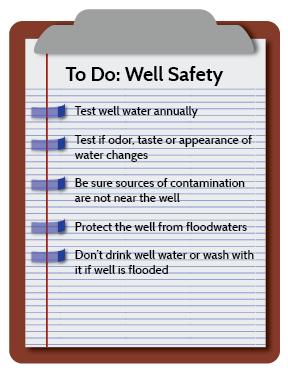
Did you know that if you live in a home with a well, you are responsible for ensuring the safety of your own drinking water?
The United States Environmental Protection Agency and the Maryland Department of the Environment regulate public water systems, but about 350,000 Maryland households rely on their own private wells as a drinking water supply. These households should take precautions to ensure the protection and maintenance of their wells.
Sample your water
Don’t wait until it’s too late. Educate yourself and protect against contaminants that can make their way into your well.
Have your water tested periodically by a state-certified laboratory that conducts a drinking water test.
At a minimum, your well should be sampled annually. In addition, you should have your well sampled anytime you detect a change in odor, taste or appearance of your water or suspect other contaminants. More frequent testing may also be warranted under certain circumstances, such as unexplained illnesses in the family, if someone in your household is pregnant or nursing or your neighbors find a contaminant in their water.
Annual sampling should be done for total coliform bacteria, nitrates, total dissolved solids and pH levels. If you suspect other contaminants, test for those. Local health departments, University of Maryland Extension, geologists at local universities and nearby public water systems can help to identify potential problems. The EPA provides a chart listing conditions or nearby activities and the contaminants that should be tested for as a result. If a contaminant is detected, results will include concentrations found and an indication of whether this level exceeds a drinking water health standard.
Properly construct, protect and maintain your well
Only a licensed well-driller may construct a new well or modify or properly abandon an existing well. Be sure to hire a licensed well driller for any new well construction, modification, abandonment or closure.
Drinking water from wells can be affected when groundwater is contaminated through surface contamination and through flood waters. Be aware of possible sources of contamination that may be close by. Maryland regulations (COMAR 26.04.04) include required setbacks from sources of contamination.
You should protect your well area by being careful about storage and disposal of household and lawn care chemicals and wastes. Make sure your well is protected from waste from livestock, pets and wildlife. Learn about groundwater and what you can do to protect it.
Wells should be located so that rainwater, which can pick up harmful bacteria and chemicals on the surface of the land, cannot collect and seep into it. Owners of wells in flood-prone areas should fit their wells with a flood-proof well cap. If you suspect that flood waters have entered your well, you should not turn on the pump because there is a danger of electrical shock and the potential for damage to the well and pump. You should not drink or wash with the well water until it is disinfected. MDE’s fact sheet provides more information on how to protect your well in flood prone areas and what to do if your well is flooded.
You should have regular maintenance done on your well and keep records of the work that is done.
Contact information
For more information, contact MDE’s Water Well Construction Program at 410-537-3784.
Additional information and related links